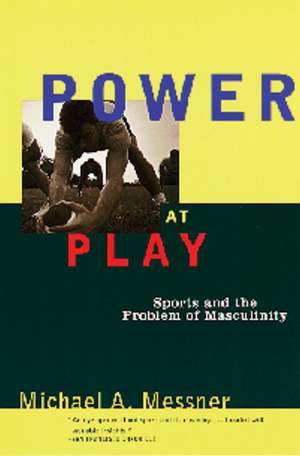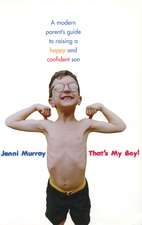Power at Play: Sports and the Problem of Masculinity: Men and Masculinity
Autor Michael A. Messneren Limba Engleză Paperback – 31 mar 1995
Preț: 170.74 lei
Nou
Puncte Express: 256
Preț estimativ în valută:
32.67€ • 34.23$ • 27.01£
32.67€ • 34.23$ • 27.01£
Carte tipărită la comandă
Livrare economică 12-26 aprilie
Preluare comenzi: 021 569.72.76
Specificații
ISBN-13: 9780807041055
ISBN-10: 080704105X
Pagini: 256
Dimensiuni: 141 x 243 x 17 mm
Greutate: 0.37 kg
Editura: Beacon Press (MA)
Seria Men and Masculinity
ISBN-10: 080704105X
Pagini: 256
Dimensiuni: 141 x 243 x 17 mm
Greutate: 0.37 kg
Editura: Beacon Press (MA)
Seria Men and Masculinity
Recenzii
"An examination of the heartland of masculinity. . . Power at Play tells us about [sport's] compelling allure, its ability to bestow self-confidence and social status. . . but also [about] the dark side of the athletic subculture. A work of clarity and insight." —Gender and Society
"An eye opener about sport and its meaning. . . Loaded with valuable insights." —San Francisco Chronicle
"The first examination of American jock culture that makes sense to me . . . Parents of young kids may find it especially interesting." —Whole Earth Review
"An eye opener about sport and its meaning. . . Loaded with valuable insights." —San Francisco Chronicle
"The first examination of American jock culture that makes sense to me . . . Parents of young kids may find it especially interesting." —Whole Earth Review
Notă biografică
Michael A. Messneris associate professor of sociology at the University of Southern California.
Textul de pe ultima copertă
Why is the American male's sense of self so closely intertwined with his success, or failure, as an athlete? What are the physical and emotional costs, to individual men and society at large, of engaging in organized athletics? Are sports good for men and boys? Michael Messner addresses these questions and more in his fascinating new study of masculinity and sports. Using interviews with thirty male former athletes, Messner argues that sports, so central to the lives of millions of boys and men, play a key role in shaping our society's definition of what it means to be a man. Messner shows us that lifelong relationships with colleagues, friends, lovers, wives, and children are affected by the barriers to intimacy constructed through sports. America's jock culture equates true manhood with athletic success, driving men to view the world in terms of status, power, and privilege. The Lombardian ethic that "winning isn't everything; it's the only thing" pushes America's athletes to continue to play even when hurt, to take drugs, and to treat women and others as mere objects. Sexism, homophobia, and racism pervade the world of sports, and Messner's conversations with male athletes of different races, classes, and sexual orientations reveal their struggles to reconcile the world of sports with the reality of their private lives. America's boys and men, as well as its girls and women, can find camaraderie and pleasure on the playing field, but the rules of the game must change first. The rules will only shift, Messner convinces us, when we begin to change our definitions of what it is to be men and women.








